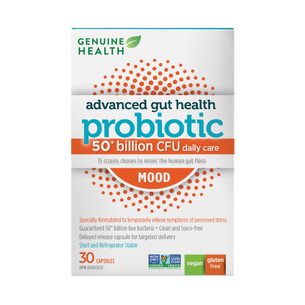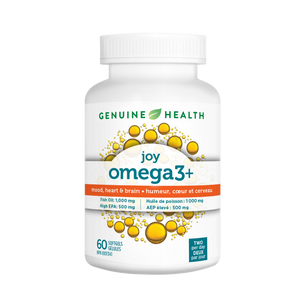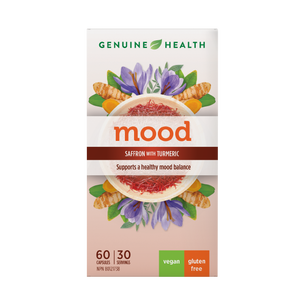The Link Between Inflammation & Mood

When the temperature drops and the days grow shorter, we often turn our attention to our immune system, and ways to stay healthy from cold and flu. Health however, does not just live in the physical, and it is equally, if not more, important to pay attention to our mental health, and take the steps to ensure our resiliency against common wintertime ailments like seasonal affective disorder.
Seasonal affective disorder (SAD) is a sub-category of depression that is related to the change of season, often starting in the fall and continuing into the winter months.1 While dark, dreary weather may have some of us feeling down for a few days, SAD is characterized by low energy, lethargy, social withdrawal, lack of interest in activities, difficulty concentrating, and feelings of hopelessness or irritability.1 If you are feeling any of these symptoms it is important to not brush them off as simply the “winter blues” and speak to a health care professional about them. There are steps however, that all of us can take to nourish our minds, increase our resiliency to mental health issues, and help keep us healthy all season long.
Vitamin D
Vitamin D is made in our body by exposure to sunlight. During the winter months however, the sun’s rays are simply not strong enough for this reaction to take place.2 This lack of sun has significant effects in Northern areas like Canada, where many individuals have been shown to have insufficient vitamin D levels during winter months.3 This is a significant risk factor behind SAD. 2 To help ward against vitamin D deficiency it is recommended to take a minimum of 1,000 IUs of vitamin D daily. 4
You can find 1000IU of vegan vitamin D in one serving of Genuine Health’s all-in-one, alongside plant-based protein, superfoods, greens, probiotics, and stress supporting ingredients like ashwagandha to help you kiss your winter blues away.
Heal Your Gut
While the health of your gut may not seem like a contributing factor to your mental health, the gut-brain connection is an extremely important link to your overall health and wellbeing. More and more we are learning about the gut-brain axis and how inflammation in the gut can increase our risk for depression.5 Dysfunction of our central nervous system has been linked to gut microbiome imbalance and inflammation.5 It is important to nourish our gut by identifying any potential food sensitivities, avoiding processed foods, and nourishing our internal microflora (i.e. our healthy bacteria). Consuming a wide variety of colourful whole foods is important for your gut, but unfortunately don’t grow too plentifully during the winter.6 Fermented foods have also gained much attention and have been shown to positively impact your gut microbiome.7
For even more gut support, try advanced gut health probiotic mood 50 billion which includes 15 diverse strains consisting of a thoughtful balance of lactobacillus and bifidobacterium providing a unique combination. With added Extramel,® a melon juice concentrate that is rich in superoxide dismutase, and powerful antioxidant that temporarily relieves symptoms of perceived stress and supports a healthy mindset.
B-Vitamins
If there is one group of vitamins that is vital for mental health it is the B-vitamins.8 B-vitamins are water-soluble. As a result, they are not stored in our body and instead rapidly pass through. Due to this, daily intake of B-vitamins is extremely important to preventing deficiencies.9 The role of B-vitamins are vast and complex, however some of their main features include helping us properly metabolize carbohydrates, protein, and fats, improve neurotransmitter function, and in the case of vitamin B6, ensuring the proper production of serotonin, aka our happy hormone.9,10 As B-vitamins don’t exist in isolation in nature, and work best together, it is important to get a daily dose of B-vitamins from whole foods like black beans, quinoa, sweet potatoes, and leafy greens.9 If you do choose to supplement be sure to choose a B-complex versus standalone B-vitamins, like in our all-in-one.
Omega-3 Fatty Acids
There are two types of omega-3 fatty acids that come into play when we are talking about brain health. Decosahexaenoic acid (DHA) is an important structural fatty acid that aids in cognition, memory, and development.11 Eicosapentaenoic acid (EPA) is more known for its anti-inflammatory effects, and acts a precursor for important anti-inflammatory signaling molecules and mediators.12
As more research is conducted, we are increasingly recognizing the significant role inflammation plays in mental health issues, such as depression. Increased inflammation and deficiencies in fatty acids have been associated with various mood disorders, including depression.13 Ongoing research has shown that supplementing with at least 1000mg of EPA can be effective in helping with symptoms of mild to moderate depression due to proposed anti-inflammatory effects.14
Genuine Health’s omega3+ joy is a high-quality fish oil sourced from sustainable, wild caught fish from around the world. With a high level of EPA, optimal for supporting a healthy mood balance, brain function, and a healthy heart. For pure natural joy from the inside out.
Spend Time Outside
One of the theories behind SAD is that the lack of light disrupts our body’s internal clock causing a drop in serotonin and increase in melatonin.2 Although those of us in the Northern latitudes don’t have a lot of availability to sunlight, getting outdoors during daylight hours has been shown to be beneficial.15 Try taking a walk every day at lunch, or choosing outdoor activities like skiing, skating, or snowshoeing on the weekends. If the weather is too bad to go out, spend time near windows, or choose a full-spectrum light to help increase your light exposure.
Exercise
Physical activity helps to release endorphins and has been shown to have significant positive effects on mood and depression.16 Aim to get some form of physical activity everyday whether if it’s a full on sweat session or just simply going for a walk, taking the stairs, or shoveling the snow. Bonus points for taking your workout outside and getting a dose of natural light with your fitness.
As we navigate through the colder months, it's essential to prioritize both our physical and mental well-being. The shorter days and limited sunlight can affect our mood and energy levels, but there are many ways to support our health during this time, from ensuring adequate nutrition, to making time for outdoor activities and exercise.
For further support against the winter blues, try Genuine Health's mood supplement, which combines saffron (Affron®) and turmeric to help lift your spirits naturally. Whether through lifestyle changes or supplement support, remember that taking care of your mind is just as important as taking care of your body.
Date Modified: January 24th, 2025
REFERENCES
1. Seasonal Affective Disorder. National Institute of Mental Health (NIMH). Accessed January 23, 2025. https://www.nimh.nih.gov/health/publications/seasonal-affective-disorder
2. Melrose S. Seasonal affective disorder: an overview of assessment and treatment approaches. Depress Res Treat. 2015;2015(1):178564. doi:10.1155/2015/178564
3. Schwalfenberg GK, Genuis SJ, Hiltz MN. Addressing vitamin D deficiency in Canada: a public health innovation whose time has come. Public Health. 2010;124(6):350-359. doi:10.1016/j.puhe.2010.03.003
4. Am I Getting Enough Vitamin D?. Mount Sinai Today. November 19, 2024. Accessed January 23, 2025. https://health.mountsinai.org/blog/am-i-getting-enough-vitamin-d/
5. Peirce JM, Alviña K. The role of inflammation and the gut microbiome in depression and anxiety. J Neurosci Res. 2019;97(10):1223-1241. doi:10.1002/jnr.24476
6. Minich DM. A review of the science of colorful, plant-based food and practical strategies for “eating the rainbow”. J Nutr Metab. 2019;2019(1):2125070. doi:10.1155/2019/2125070
7. Leeuwendaal NK, Stanton C, O’Toole PW, Beresford TP. Fermented foods, health and the gut microbiome. Nutrients. 2022;14(7):1527. doi:10.3390/nu14071527
8. Mahdavifar B, Hosseinzadeh M, Salehi-Abargouei A, Mirzaei M, Vafa M. Dietary intake of B vitamins and their association with depression, anxiety, and stress symptoms: a cross-sectional, population-based survey. J Affect Disord. 2021;288:92-98. doi:10.1016/j.jad.2021.03.055
9. Hanna M, Jaqua E, Nguyen V, Clay J. B vitamins: functions and uses in medicine. Perm J. 2022;26(2):89-97. doi:10.7812/TPP/21.204
10. Stover PJ, Field MS. Vitamin B-6. Adv Nutr. 2015;6(1):132-133. doi:10.3945/an.113.005207
11. Sun GY, Simonyi A, Fritsche KL, et al. Docosahexaenoic acid (DHA): an essential nutrient and a nutraceutical for brain health and diseases. Prostaglandins Leukot Essent Fatty Acids. 2018;136:3-13. doi:10.1016/j.plefa.2017.03.006
12. Crupi R, Cuzzocrea S. Role of EPA in inflammation: mechanisms, effects, and clinical relevance. Biomolecules. 2022;12(2):242. doi:10.3390/biom12020242
13. Wani AL, Bhat SA, Ara A. Omega-3 fatty acids and the treatment of depression: a review of scientific evidence. Integr Med Res. 2015;4(3):132-141. doi:10.1016/j.imr.2015.07.003
14. Sontrop J, Campbell MK. ω-3 polyunsaturated fatty acids and depression: A review of the evidence and a methodological critique. Prev Med. 2006;42(1):4-13. doi:10.1016/j.ypmed.2005.11.005
15. Wirz-Justice A, Graw P, Kräuchi K, et al. ‘Natural’ light treatment of seasonal affective disorder. J Affect Disord. 1996;37(2):109-120. doi:10.1016/0165-0327(95)00081-X
16. Peiser B. Seasonal affective disorder and exercise treatment: a review. Biol Rhythm Res. 2009;40(1):85-97. doi:10.1080/09291010802067171





















































